Q&A: Six things you need to know about the Catalan election results
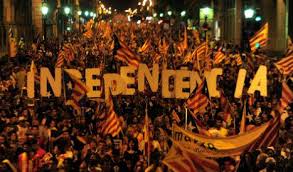
The election billed as a de facto referendum on independence for Catalonia has produced some interesting results. Here's what you need to know.
So did Catalonia vote for independence or not?
Well, yes and no.
Pro-independence parties did win the most seats. Junts pel Sí –Together for Yes- which incorportates Artur Mas’s CDC centre right party and the left wing ERC – secured 62 seats in the regional parliament.
And the radical left CUP, which is also pushing for an independent state won 10 seats. If they can team up that gives separatist parties 72 seats, four above the critical 68 needed for an absolute majority.
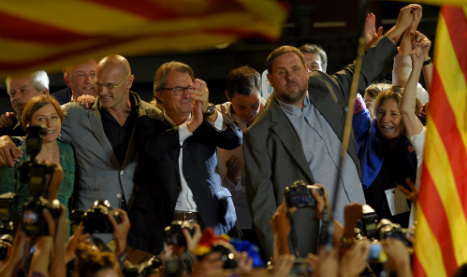
Junts pel Sí celebrating after declaring victory. Photo: AFP
But the vote was billed as a de facto referendum on independence, in which case, the separatists failed to win their plebiscitary election.
Over 1.9 million Catalans voted for independence parties, either the Junts pel Sí coalition or the radical left separatist CUP. With four million ballots cast that shows the separatists fell short of getting 50 percent of the vote that would have given them legitimacy to push forward on the independent path.
Instead detractors in Madrid and within Catalonia itself are well placed to argue that there is no mandate to form an independent state.
If you are wondering why an absolute majority can be formed without more than 50 percent of the votes, it's because the seats are weighted to those who win most votes, in theory to make it easier to form stable governments.
What next for independence?
From the rhetoric heard from the podium at the Junts pel Si party following the results, the platform is convinced that it has a mandate to push forward towards an independent Catalonia
Raül Romeva, the lead candidate for Junts pel Sí, has insisted that a declaration of independence is inevitable, even if Madrid refuses to negotiate, while his ally Artur Mas claimed that that the results gave “strength and legitimacy” to secession from Spain.
"If the state shows no will to negotiate, we will do it anyway, because we have a mandate," Romeva told AFP following the result on Sunday night.
Presuming that a deal can be struck between Junts pel Sí and its awkward bedfellow the CUP, then a declaration will be issued outlining the independence process with a view to breaking away from Spain by 2017.
So who are these kingmakers?
The Candidatura d'Unitat Popular (CUP) - or Popular Unity Candidacy in English, won just ten seats but is the party that holds the key to the stability of the Catalan parliament and whether the region will push forward with independence.
Having tripled the number of seats it won from three in 2012 to ten in 2015, this radical left anti-capitalist party needs to team up with the Junts pel Sí coalition to provide the absolute majority for a separatist government.
But the way forward will be far from smooth and they have already made several declarations which point to the fact that the pro-independence parties could be uneasy bedfellows.
Immediately after the election results, Quim Arrufat of the CUP told Catalan television channel TV3 that the party would not support Artur Mas as president, with CUP candidate Antonio Baños warning Mas that “no one is indispensable”.
Mas, the current president of the Catalan regional parliament, had been chosen as the candidate of the Junts pel Sí pro-independence coalition, so will they choose another candidate to appease the CUP?
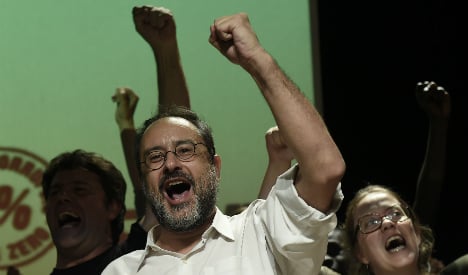
Antonio Baños. Photo: Josep Lago/AFP
The CUP are also eager to get the independence ball rolling, having expressed their desire to start secession proceedings sooner than 18 months (Junts pel Sí said negotiations with Madrid would take about a year and a half.)
The CUP also hit the Spanish headlines on Monday after its candidate Antion Baños said that "the Catalan sovereignty can disobey all Spanish laws."
"The Catalan people have started a revolution," he said.
The CUP are on the other side of the political spectrum to Artur Mas' CDC which highlights what could prove one of the biggest problems of the pro-independence coalition: apart from on independence, their political views are completely different
What is the reaction in Madrid?
We haven't heard yet from Prime Minister Mariano Rajoy himself but his party's spokesman Pablo Casado, vowed that the government would "continue to defend the unity of Spain".
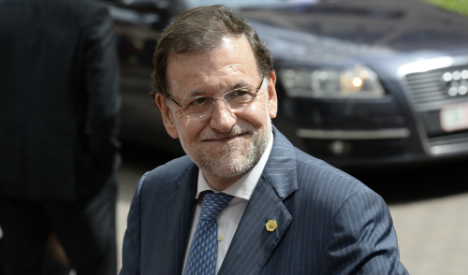
Photo: AFP
The government has been predictably dismissive of the result, insisting that it represents a failure for Artur Mas and his separatist ideas.
"This election should serve to end the independence debate once and for all," Casado said.
And as long as the PP are in power there is little chance of them sitting down at the negotiating table. However, with elections due in December that will likely bring a power shift, the future is far from clear.
Why are Ciutadans so pleased with themselves?
One clear success story has been that of the centrist party that has been catapulted into second position in Catalonia.
Ciutadans is the Catalan arm of national party Ciudadanos - the Citizens in English. The party launched in Catalonia in 2006 and nationally at the start of 2015. The C's billed itself as the only anti-independence alternative in Catalonia and has done amazingly well, winning 25 seats compared to nine in 2012.
Ciutadans is now the second biggest party in the Catalan parliament and the biggest anti-independence party.
C’s strongly defends the ideology of: "Catalonia is my homeland, Spain is my country and the European Union is our future".
"There is a majority that is not separatist," said Ciudadanos’ national leader Albert Rivera on Sunday night. "C’s is standing up for – through the union – regenerating Spain."
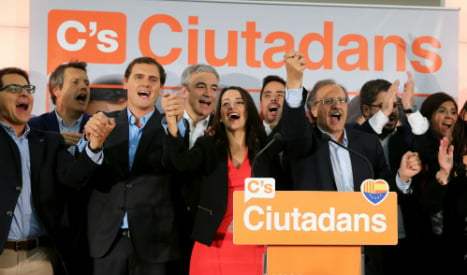
Photo: Cesar Manso/AFP
C’s success has catapulted its leader in Catalonia, Inés Arrimadas (above centre), from unknown to leader of the opposition. The only female presidential candidate and the youngest, at 34, Arrimadas on Sunday night called for the current president of the Catalan parliament, Artur Mas, to resign:
"With today’s result, Artur Mas can only do one thing and that is to resign and go home. Resign, resign, resign," she said to cheering crowds.
Arrimadas also called for new electons:
"There is only one option and that is to have new elections in which we run as parties with our programmes, Junts pel Si did not do that in this election. We did."
"We call for new elections in which Catalans choose which parties and programmes will govern the future of the seven and a half million Catalan people," she said.
C’s success bodes well for them in December’s general election.
The question now is could the C’s overtake Podemos as Spain’s biggest "alternative" party - they represent a tempting prospect for Spaniards who are fed up of the two main parties but don’t want to vote for anyone they see as too "radical".
What does it mean for December’s election?
A great result for Ciudadanos but a pretty poor performance on the part of Podemos backed regional anti-austerity platform Catalunya Si Que Es Pot, or Catalonia Yes It Is Possible.
The coalition failed to secure more seats than conservative Popular Party in the region in what was described by Pablo Iglesias as a huge disappointment. Did the party fail to garner support in the region because it refused to engage in the independence debate?
Or is it a sign that the initial surge of enthusiasm for its radical politics is terminally on the wane and that voters have been put off the Syriza ally as the nation bounces back from the brink of economic collapse?
On the other hand, the clash with Catalonia over independence could play well for the PP in the rest of Spain as their consistently strong stance to keep the nation united and strong, wins back traditionalists.
One thing is sure, the looming crisis in Catalonia will plunge Spain into political uncertainty ahead of national elections.
Comments
See Also
So did Catalonia vote for independence or not?
Well, yes and no.
Pro-independence parties did win the most seats. Junts pel Sí –Together for Yes- which incorportates Artur Mas’s CDC centre right party and the left wing ERC – secured 62 seats in the regional parliament.
And the radical left CUP, which is also pushing for an independent state won 10 seats. If they can team up that gives separatist parties 72 seats, four above the critical 68 needed for an absolute majority.

Junts pel Sí celebrating after declaring victory. Photo: AFP
But the vote was billed as a de facto referendum on independence, in which case, the separatists failed to win their plebiscitary election.
Over 1.9 million Catalans voted for independence parties, either the Junts pel Sí coalition or the radical left separatist CUP. With four million ballots cast that shows the separatists fell short of getting 50 percent of the vote that would have given them legitimacy to push forward on the independent path.
Instead detractors in Madrid and within Catalonia itself are well placed to argue that there is no mandate to form an independent state.
If you are wondering why an absolute majority can be formed without more than 50 percent of the votes, it's because the seats are weighted to those who win most votes, in theory to make it easier to form stable governments.
What next for independence?
From the rhetoric heard from the podium at the Junts pel Si party following the results, the platform is convinced that it has a mandate to push forward towards an independent Catalonia
Raül Romeva, the lead candidate for Junts pel Sí, has insisted that a declaration of independence is inevitable, even if Madrid refuses to negotiate, while his ally Artur Mas claimed that that the results gave “strength and legitimacy” to secession from Spain.
"If the state shows no will to negotiate, we will do it anyway, because we have a mandate," Romeva told AFP following the result on Sunday night.
Presuming that a deal can be struck between Junts pel Sí and its awkward bedfellow the CUP, then a declaration will be issued outlining the independence process with a view to breaking away from Spain by 2017.
So who are these kingmakers?
The Candidatura d'Unitat Popular (CUP) - or Popular Unity Candidacy in English, won just ten seats but is the party that holds the key to the stability of the Catalan parliament and whether the region will push forward with independence.
Having tripled the number of seats it won from three in 2012 to ten in 2015, this radical left anti-capitalist party needs to team up with the Junts pel Sí coalition to provide the absolute majority for a separatist government.
But the way forward will be far from smooth and they have already made several declarations which point to the fact that the pro-independence parties could be uneasy bedfellows.
Immediately after the election results, Quim Arrufat of the CUP told Catalan television channel TV3 that the party would not support Artur Mas as president, with CUP candidate Antonio Baños warning Mas that “no one is indispensable”.
Mas, the current president of the Catalan regional parliament, had been chosen as the candidate of the Junts pel Sí pro-independence coalition, so will they choose another candidate to appease the CUP?

Antonio Baños. Photo: Josep Lago/AFP
The CUP are also eager to get the independence ball rolling, having expressed their desire to start secession proceedings sooner than 18 months (Junts pel Sí said negotiations with Madrid would take about a year and a half.)
The CUP also hit the Spanish headlines on Monday after its candidate Antion Baños said that "the Catalan sovereignty can disobey all Spanish laws."
"The Catalan people have started a revolution," he said.
The CUP are on the other side of the political spectrum to Artur Mas' CDC which highlights what could prove one of the biggest problems of the pro-independence coalition: apart from on independence, their political views are completely different
What is the reaction in Madrid?
We haven't heard yet from Prime Minister Mariano Rajoy himself but his party's spokesman Pablo Casado, vowed that the government would "continue to defend the unity of Spain".

Photo: AFP
The government has been predictably dismissive of the result, insisting that it represents a failure for Artur Mas and his separatist ideas.
"This election should serve to end the independence debate once and for all," Casado said.
And as long as the PP are in power there is little chance of them sitting down at the negotiating table. However, with elections due in December that will likely bring a power shift, the future is far from clear.
Why are Ciutadans so pleased with themselves?
One clear success story has been that of the centrist party that has been catapulted into second position in Catalonia.
Ciutadans is the Catalan arm of national party Ciudadanos - the Citizens in English. The party launched in Catalonia in 2006 and nationally at the start of 2015. The C's billed itself as the only anti-independence alternative in Catalonia and has done amazingly well, winning 25 seats compared to nine in 2012.
Ciutadans is now the second biggest party in the Catalan parliament and the biggest anti-independence party.
C’s strongly defends the ideology of: "Catalonia is my homeland, Spain is my country and the European Union is our future".
"There is a majority that is not separatist," said Ciudadanos’ national leader Albert Rivera on Sunday night. "C’s is standing up for – through the union – regenerating Spain."

Photo: Cesar Manso/AFP
"With today’s result, Artur Mas can only do one thing and that is to resign and go home. Resign, resign, resign," she said to cheering crowds.
Arrimadas also called for new electons:
"There is only one option and that is to have new elections in which we run as parties with our programmes, Junts pel Si did not do that in this election. We did."
"We call for new elections in which Catalans choose which parties and programmes will govern the future of the seven and a half million Catalan people," she said.
C’s success bodes well for them in December’s general election.
The question now is could the C’s overtake Podemos as Spain’s biggest "alternative" party - they represent a tempting prospect for Spaniards who are fed up of the two main parties but don’t want to vote for anyone they see as too "radical".
What does it mean for December’s election?
A great result for Ciudadanos but a pretty poor performance on the part of Podemos backed regional anti-austerity platform Catalunya Si Que Es Pot, or Catalonia Yes It Is Possible.
The coalition failed to secure more seats than conservative Popular Party in the region in what was described by Pablo Iglesias as a huge disappointment. Did the party fail to garner support in the region because it refused to engage in the independence debate?
Or is it a sign that the initial surge of enthusiasm for its radical politics is terminally on the wane and that voters have been put off the Syriza ally as the nation bounces back from the brink of economic collapse?
On the other hand, the clash with Catalonia over independence could play well for the PP in the rest of Spain as their consistently strong stance to keep the nation united and strong, wins back traditionalists.
One thing is sure, the looming crisis in Catalonia will plunge Spain into political uncertainty ahead of national elections.
Join the conversation in our comments section below. Share your own views and experience and if you have a question or suggestion for our journalists then email us at [email protected].
Please keep comments civil, constructive and on topic – and make sure to read our terms of use before getting involved.
Please log in here to leave a comment.